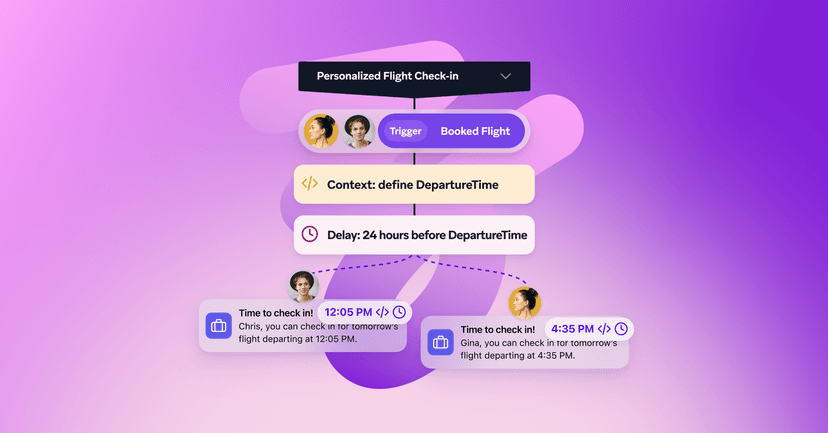Are Facebook’s Chatbots the Future of Customer Relationships?
Published on April 14, 2016/Last edited on April 14, 2016/7 min read


Todd Grennan
Content Production Principal, Content Marketing at BrazeFacebook unveiled plenty of big, new things at this year’s F8 Conference, held April 12–13 in San Francisco: live video streaming; open access to Instant Articles; a Facebook “save” button; and a whole lot more. But nothing attracted more attention than the announcement that Facebook Messenger will begin supporting chatbots associated with third-party brands. (Don’t know what a chatbot is? Check out Re/code’s primer on all things chatbot.)
That’s not surprising. Because while those other features will likely add value to the Facebook experience, the addition of customer-facing brand-controlled chatbots to Facebook Messenger has the potential to have a fundamental impact on the way that companies interact with their customers going forward—and position Facebook as perhaps the most essential player in the emerging platform economy.
Yeah. Chatbots could be THAT big a deal. But of course, it’s not a sure thing.
Chatbots: Tomorrow’s neighborhood merchant?
To fully understand the significance of this new development, you need to look backwards. To a time when close, two-way relationships between brands and their customers were commonplace.
Long before the rise of smartphones and computers and chain stores, it was normal for consumers to patronize the same butcher, baker, and grocer every week. You’d tell your local grocer what you wanted, what you liked, what you were interested in buying. And they’d listen. Over time, these merchants learned about you—how you shopped, the items you bought repeatedly, even what you valued—and could use that knowledge to serve you better by anticipating your needs and making recommendations based on your actual interests and preferences.
In most places, that approach to customer engagement fell away, replaced by broader-scale, more general approaches to customer engagement. Billboards. TV ads. Coupons in your local paper. But when mobile arrived on the scene, that began to change. Smartphones and tablets allow brands to gather vast amounts of customer data and to use that data to power individually targeted, personalized outreach, supporting old-fashioned, intimate customer/brand relationships on a new, global scale.
Strong relationships are two-way relationships
With its chatbot announcement, Facebook is acknowledging that two-way interactions between brands and their customers are the future of customer relationships and positioning its Facebook Messenger platform as a major channel for this kind of communication.
In the world that Facebook envisions, a customer who is looking to buy shoes or find out movie showtimes or get in touch with a company’s customer support will do it not by calling a 1-800 number or even visiting a brand’s website or app, but by sending a message to a brand-controlled chatbot within Facebook Messenger. That chatbot will engage with the message, automatically parse its intent, and help the customer quickly achieve their goal over the course of a chat conversation.
As Facebook co-founder and CEO Mark Zuckerberg put it, “To order from 1-800-Flowers, you never have to call 1-800-Flowers ever again. You don’t have to install an app or enter your credit card.”
How chatbots could help brands
Right now, app installs cost brands and average of $1.78 on iOS and $2.51 on Android—but, since average retention rates drop to less than 5% after three months, gaining a new, loyal customer can cost up to 25 times more. And because most people spend 80% of their mobile time on their top three apps, it’s become hard for many brands to build and maintain an audience on mobile.
If your brand is looking to reach more potential customers, the introduction of bots could make the Facebook Messenger platform an appealing option. With more than 900 million monthly active users, Facebook Messenger is one of those top three apps for a lot of people. And because Facebook works across virtually all major mobile operating systems, mobile devices, and computers, brands will be able to easily reach an enormous audience on all sorts of devices without needing to convince them to download an app or visit a website, and without having to hire an army of customer service representatives to engage with them.
How chatbots might not help at all
However, while China’s WeChat messaging service has successfully used third-party chatbot support to establish itself as the kind of one-stop customer/brand platform that Facebook is seeking to create, it’s not clear if consumers in the U.S. will warm to the concept as quickly. If customers end up viewing chatbots as a fun, convenient, time-saving way to engage with brands, the potential upside for those brands (and for Facebook) are enormous. If, on the other hand, people come to see chatbots as the mobile-first version of those automated customer service phone trees that everyone hates, this technology will probably never see its full potential.
A lot will depend on how pleasant (and how lifelike) the bot experience is for customers. And that, in turn, will depend in large part on how much customer information those chatbots will have access to. If you message a brand and say you want to buy pants, will the chatbot know your gender, your pants size, or the fact that you loathe low-waisted jeans? Or will they have to gather all that information by asking you a long series of pants-related questions? Right now, it’s an open question. If Facebook provides brands with access to customer information as part of their Facebook Messenger integration (or allows them to easily import data from other sources), it should be possible to replicate the personalized customer experience that makes mobile such a compelling technology for audience engagement. If not, the experience may be pretty frustrating.
What does Facebook’s announcement mean for your brand right now?
For most brands, the smart move will be to wait and see. Only about 40 chatbots are currently live on the Facebook Messenger platform and it’s too early to tell if they’ll prove to be an effective way to reach most customers. Similarly, while Facebook is currently not charging brands to use chatbots on its platform, that’s expected to change over time, making it hard to tell what the full cost of engaging with customers via this platform will be over the long haul. (Plus, with Google and other big names reportedly planning their own chatbot support, Facebook likely won’t be the only game in town.)
However, this announcement definitely DOESN’T mean that apps are suddenly on the verge of extinction. Brands with mobile apps have a major advantage when it comes to collecting data and successfully engaging their customer base, and Facebook will have to demonstrate that its new chatbot functionality can provide a better, more effective experience for customers and brands alike before widespread adoption takes place.
Thoughtful, personal marketing will always win
Keep an eye on this space. But make sure you don’t neglect your mobile efforts. Even if chatbots do someday supplant apps and other engagement channels, brands that have been successfully cultivating and engaging their customers on mobile are going to be uniquely positioned to take advantage of the possibilities that bots offer.
To build a strong customer/brand relationship, you need to know how to gather useful, actionable customer data, and how to use that data to drive the kind of thoughtful, personal interactions that great customer experiences are built on. That’s going to be true whether you’re engaging with your audience via chatbot, mobile app, website, email, or anything else.
Technology is important, but it’s the relationships that technology makes possible that enable a brand’s long term success.
Be Absolutely Engaging.™
Sign up for regular updates from Braze.
Related Content
 Article13 min read
Article13 min readBraze vs Salesforce: Which customer engagement platform is right for your business?
February 19, 2026 Article18 min read
Article18 min readBraze vs Adobe: Which customer engagement platform is right for your brand?
February 19, 2026 Article7 min read
Article7 min readEvery journey needs the right (Canvas) Context
February 19, 2026